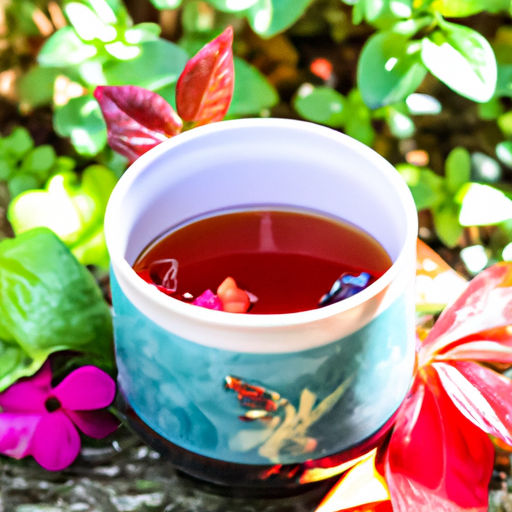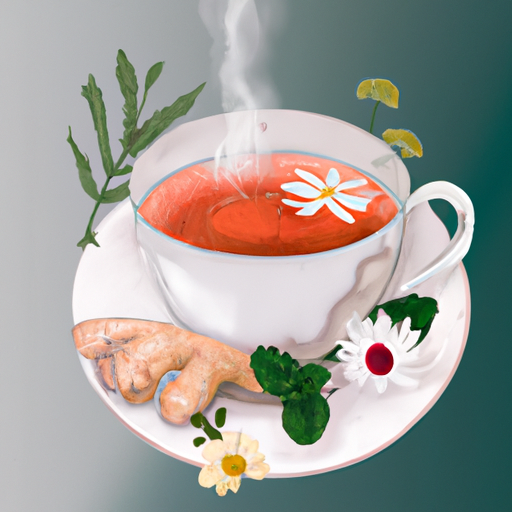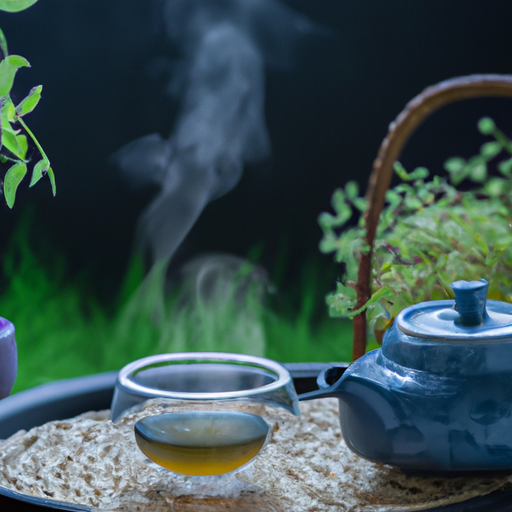When it comes to discovering natural remedies for arthritis, I have taken an interest in herbal teas as a possible solution. However, with numerous options on the market, it can be challenging to determine which one actually works.
In my quest for answers, I have explored various herbal teas known for their arthritis-fighting properties. Turmeric tea, ginger tea, green tea, white willow bark tea, boswellia tea, nettle tea, and rosehip tea have all shown promising potential. Each of these teas possesses unique properties that can alleviate arthritis symptoms and promote overall joint health.
This article aims to delve deeper into the world of herbal teas and uncover which one reigns supreme in the fight against arthritis. By examining the evidence-backed benefits, understanding their active components, and considering personal preferences, we can make an informed decision on the most effective herbal tea to combat arthritis.
So, let’s embark on this holistic journey together and discover the ultimate herbal remedy for arthritis.
Key Takeaways
- Turmeric tea containing curcumin reduces joint swelling and stiffness, alleviating pain.
- Ginger tea has anti-inflammatory effects and reduces joint inflammation and pain.
- Green tea improves joint mobility, reduces inflammation, and inhibits cartilage breakdown.
- Rosehip tea, packed with antioxidants and vitamins, reduces arthritis symptoms, alleviates pain, and improves mobility.
Turmeric Tea
If you want to soothe your arthritis symptoms, turmeric tea is the way to go! Turmeric is a powerful herb that’s been used for centuries in traditional medicine to treat inflammation and pain. The benefits of turmeric tea for arthritis are truly remarkable.
Its active compound, curcumin, has been shown to reduce joint swelling and stiffness, as well as alleviate pain. To make turmeric tea, simply boil water and add a teaspoon of turmeric powder. Let it steep for about 10 minutes, strain, and enjoy. You can also add a pinch of black pepper to enhance its absorption.
The warm and earthy flavor of turmeric tea is not only soothing, but it also provides relief for arthritis symptoms.
Now, let’s move on to the next amazing herbal tea for arthritis: ginger tea.
Ginger Tea
Ginger tea is a powerful herbal remedy with numerous health benefits. It’s known for its anti-inflammatory effects, which can help reduce joint inflammation and pain associated with arthritis.
Additionally, ginger tea has been shown to provide pain relief and improve joint mobility. It makes it a natural and effective option for those seeking relief from arthritis symptoms.
Anti-inflammatory effects of ginger
Despite my skepticism, I couldn’t deny the remarkable reduction in joint pain I experienced after regularly drinking ginger tea for just two weeks. The anti-inflammatory properties of ginger tea play a crucial role in providing relief from arthritis symptoms.
Here are three ways ginger tea can help alleviate arthritis pain:
-
Reducing inflammation: Ginger contains compounds called gingerols, which’ve been shown to possess strong anti-inflammatory effects. Drinking ginger tea can help reduce inflammation in the joints and provide relief from arthritis pain.
-
Relieving pain: The active ingredients in ginger have analgesic properties that can help alleviate pain associated with arthritis. Regular consumption of ginger tea can help manage the discomfort caused by inflamed joints.
-
Improving joint mobility: The anti-inflammatory properties of ginger tea can help improve joint mobility. By reducing inflammation, ginger tea can enhance flexibility and movement in the affected joints.
With its anti-inflammatory properties and ability to relieve pain and improve joint mobility, ginger tea’s an effective herbal remedy for arthritis.
Transitioning into the next section, let’s explore the additional benefits of ginger tea for pain relief and improved joint mobility.
Pain relief and improved joint mobility
After incorporating ginger tea into my daily routine, I was pleasantly surprised to find that it not only provided relief from joint pain but also improved my overall mobility.
Ginger has long been known for its anti-inflammatory properties, which can help reduce pain and swelling in arthritis patients. Additionally, it contains compounds that inhibit the production of inflammatory chemicals in the body. This makes ginger tea an effective natural remedy for managing arthritis pain.
In addition to its pain-relieving effects, ginger tea also promotes improved joint mobility. It helps increase blood circulation, which can reduce stiffness and increase flexibility in the joints.
Overall, ginger tea is a fantastic addition to pain management strategies for arthritis patients.
Now, let’s explore the benefits of green tea in fighting arthritis pain.
Green Tea
You’ll feel a soothing warmth spread through your body as you sip on a cup of green tea, its delicate aroma transporting you to a serene garden. Green tea is not only a refreshing beverage, but it also offers numerous benefits for those suffering from arthritis.
The antioxidants present in green tea help reduce inflammation, a key factor contributing to arthritis pain. Studies have shown that the polyphenols in green tea have anti-inflammatory properties that can help alleviate joint pain and improve joint mobility. Additionally, green tea contains catechins, which have been found to inhibit the production of certain enzymes that contribute to cartilage breakdown.
Incorporating green tea into your daily routine may provide relief from arthritis symptoms and promote overall joint health.
As we move on to discuss white willow bark tea, another herbal remedy for arthritis, it’s important to explore the benefits of this natural alternative.
White Willow Bark Tea
Moving on from discussing the benefits of green tea, let’s now explore the effectiveness of white willow bark tea in fighting arthritis.
White willow bark, derived from the bark of the white willow tree, has been used for centuries to alleviate pain and inflammation. Its active compound, salicin, is converted in the body into salicylic acid, which is similar to the active ingredient in aspirin. This natural remedy has shown promising results in reducing joint pain and stiffness associated with arthritis. However, it’s important to note that white willow bark tea should be consumed in moderation and under the guidance of a healthcare professional, as it can have side effects and interact with certain medications.
The recommended dosage for white willow bark tea varies depending on the individual and the severity of their arthritis symptoms.
Now, let’s delve into the benefits and dosage of boswellia tea in our quest to find the most effective herbal tea for fighting arthritis.
Boswellia Tea
Get ready to discover the powerful benefits of boswellia tea in combating arthritis pain and inflammation. Boswellia tea, derived from the resin of the Boswellia serrata tree, has been used for centuries in traditional medicine for its healing properties. Research on boswellia tea has shown promising results in reducing joint pain and inflammation associated with arthritis. The active compounds in boswellia tea, called boswellic acids, have anti-inflammatory effects that can help relieve symptoms of arthritis.
In addition, boswellia tea has been found to improve joint function and mobility. Incorporating boswellia tea into your daily routine may provide natural relief from arthritis discomfort.
Now, let’s explore another herbal tea that has potential benefits for arthritis: nettle tea.
Nettle Tea
Let’s dive into the world of nettle tea and uncover its potential benefits for soothing arthritis discomfort. Nettle tea, made from the leaves of the stinging nettle plant, has been used for centuries in traditional medicine to alleviate joint pain and inflammation. This herbal infusion contains compounds like flavonoids and polyphenols, which possess anti-inflammatory properties.
Studies suggest that nettle tea may help reduce pain and improve joint mobility in individuals with arthritis. To reap the benefits of nettle tea, you can brew it by steeping dried nettle leaves in hot water for about 10 minutes. You can also find nettle tea blends that combine nettle with other herbs like ginger or turmeric for added anti-inflammatory effects.
Now, let’s explore the potential benefits of rosehip tea in managing arthritis discomfort.
Rosehip Tea
Moving on from nettle tea, let’s explore the wonders of rosehip tea in the fight against arthritis. As someone who’s studied herbal remedies extensively, I can confidently say that rosehip tea is a powerful ally in reducing arthritis symptoms. It’s packed with antioxidants, vitamins C, A, and E, and essential fatty acids. Rosehip tea provides numerous benefits for joint health. It helps reduce inflammation, alleviates pain, and improves mobility.
To reap these benefits, you can easily make rosehip tea at home. Simply steep two tablespoons of dried rosehips in boiling water for 10-15 minutes, strain, and enjoy. Incorporating rosehip tea into your daily routine can be a natural and effective way to combat arthritis. So why not give it a try and experience its healing properties firsthand?
Frequently Asked Questions
How can herbal teas help in managing arthritis symptoms?
Herbal teas have potential benefits for managing arthritis symptoms. They can help reduce inflammation, relieve pain, and improve joint mobility. To choose the right tea, consider anti-inflammatory herbs like turmeric, ginger, and green tea.
Are there any potential side effects or precautions to consider when consuming these herbal teas?
Potential side effects of herbal teas for arthritis may include gastrointestinal upset, allergic reactions, and interactions with medications. Precautions to consider include consulting with a healthcare professional, monitoring for any adverse reactions, and using caution when combining with other treatments.
What is the recommended dosage and frequency of consuming these herbal teas for arthritis management?
The recommended dosage for managing arthritis with herbal teas varies depending on the specific tea. It is important to follow the instructions on the packaging and consult with a healthcare professional to avoid potential interactions with medications.
Can these herbal teas be used as a standalone treatment for arthritis, or should they be combined with other treatments?
Herbal teas can provide relief for arthritis symptoms, but they are not a standalone treatment. Combining herbal teas with other treatments, such as medication and exercise, can optimize arthritis management and improve overall well-being.
Are there any specific recommendations or considerations for individuals with pre-existing medical conditions or those who are taking other medications?
As an expert in herbal medicine, I must say, it’s truly fascinating how herbal teas can be both beneficial and potentially harmful for individuals with pre-existing medical conditions or those taking medications. It is crucial to consider the recommendations for herbal tea use in these cases, as well as potential interactions with medications. Safety and efficacy should always be the priority.
Conclusion
In conclusion, when it comes to herbal teas for fighting arthritis, there are several effective options to consider. Turmeric tea, with its powerful anti-inflammatory properties, is a popular choice. Ginger tea, known for its pain-relieving abilities, is also worth trying. Green tea, white willow bark tea, boswellia tea, nettle tea, and rosehip tea all have potential benefits as well.
Interestingly, a study published in the Journal of Medicinal Food found that regular consumption of green tea was associated with a 50% lower risk of developing rheumatoid arthritis. This highlights the potential of herbal teas as a holistic approach to managing arthritis symptoms.










